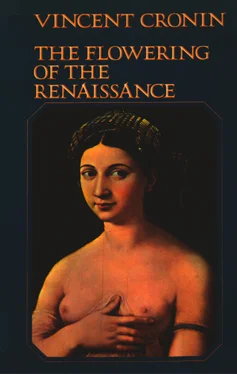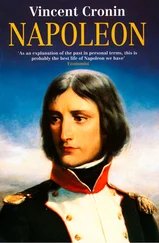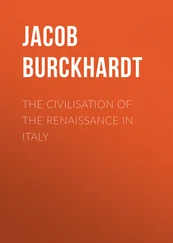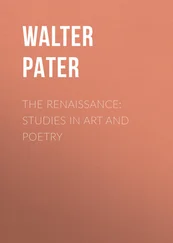So much for Leo’s positive achievements. They were important at the time and have left to the world a rich legacy of Christian humanism. His other activities reflect the same large-mindedness. One or two of them, however, innocent in themselves, represented tinder in regions which had already shown themselves highly critical of the Church.
The first is hunting. Leo had begun to ride to hounds at the age of nine. He liked the sport for itself and because it was good for his health and figure. He saw no reason why he should not continue to practise it as Pope. In 1516 he hunted thirty-seven days in a row. If kept in Rome by business, he would run down deer and stags in the Baths of Diocletian, but the country he preferred was the wooded hills around Viterbo, where after a hard ride he could soak in the warm baths. ‘He left Rome without a stole,’ lamented his master of ceremonies in January 1514, ‘and, what is worse, without his rochet; and, worst of all, with boots on. That is quite incorrect, for no one can kiss his feet.’ Leo just laughed at this punctiliousness. Peasants lined the road to offer presents, being rewarded so generously, says Giovio, that they saw in Leo’s arrival, a harvest far more productive than the best from their fields. At dawn teams of men enclosed a section of the forest with sheets of canvas, each sixty feet long and six feet high, fastened with wooden hooks and held upright by forked poles. At a signal from Leo, transmitted from glen to glen by the sound of horns, groups of archers, halberdiers, gamekeepers and beaters would drive the game forward with shouts and the beating of drums. The main sport came from deer, boar or wolf. Spectacles on his nose, Leo would dispatch these with lance or javelin. Firearms were not used, being considered unsporting.
Leo’s hunts were an occasion for display. His hounds imported from France, his falcons from Crete, the Pope was attended by a suite of 140 horsemen, a body guard of 160 and the poet Guido Postumo, who put the whole colourful chase into verse. Inevitably this encouraged lavish spending among the sacred college. Cardinals began to give their hounds silver collars or gold-encrusted leashes, and in 1514 Sanseverino appeared at the papal hunt with a lion skin round his shoulders. Galeotto della Rovere bought a string of racehorses, and Cibo opened a stud to provide fast hunters. Italians expected prelates to participate in lordly sports and to look the part, but other nationalities found these activities shocking. In Portugal, for example, clergy were forbidden to hunt; and the ban was made, at the King’s request; by Leo himself.
The second activity to occasion adverse comment was Leo’s attendance at banquets, his own and others’. He gave lavish dinners in the Vatican at which delicious food, including peacocks’ tongues, was served on chased silver, and the best musicians in Italy sang and played. Leo himself ate moderately, though he had a penchant for lampreys cooked with cloves and nuts in a Cretan wine sauce; after dinner he joked publicly with his Dominican clown, Fra Mariano, who possessed a prodigious appetite and is said to have eaten twenty chickens at a sitting. Leo would set Mariano going by serving him a delicious-looking dish containing ravens or apes or even pieces of string, then rock with laughter as the clown champed at the tough food and tried to disguise his misery with polite smiles or expressions of bliss.
Leo enjoyed going out to banquets too. The most famous were given by Agostino Chigi. A native of Siena, for fifteen years Chigi was the leading banker in Europe. He handled Tolfa alum for the Popes and his annual income amounted to 87,000 ducats. He possessed bathroom fixtures of solid silver and an ivory and silver bed that cost 1,592 ducats. The famous Imperia had for long graced this prodigious couch, but now Chigi suffered from dropsy and took his pleasure in other ways. Once he offered dinner to the sacred college, at which every cardinal was served delicacies brought by special messenger from his own region or country, on silver engraved with his coat of arms. But Chigi’s tour de force was a dinner for Leo, held in a loggia overlooking the Tiber. To prove to his guests that the same silver was not used twice, after each course he instructed his servants to throw the silver dishes into the river. Nets however had been laid underwater, from which the silver was later retrieved.
If Leo’s presence at banquets was criticized abroad, at least he brought to these otherwise vulgar displays the Medici wit he had inherited from Lorenzo. When the Emperor sent him fourteen hunting eagles Leo, in a letter of thanks, joked about the danger of giving away his emblem of imperial power. When he wished to give a red hat to his nephew, Innocenzo Cibo, and someone objected that he was only twenty-one, Leo remembered that he had received the cardinalate younger still from a Pope of the same name, and said with his usual smile, ‘What I received from Innocent, I repay to Innocent.’ When a Venetian presented him with a poem on the art of making gold, Leo sent back a richly decorated purse but, contrary to his usual practice, empty: ‘since you possess the secret of filling it’. And wit led to wit. Leo gave Fra Mariano a post as piombatore : the work involved affixing a lead seal to papal bulls and brought in 800 ducats a year, which prompted the clown to boast that he had discovered the alchemists’ secret, since now he could make gold out of lead.
Trifles such as these help to set a tone. The tone in Leo’s Rome was broadminded and gay. Taken in conjunction with his patronage of learning, Latin literature, Italian comedy and the plastic arts, Leo may be said to have achieved his ambition of making Rome the most civilized city in Europe. At any rate it was now the place where everyone wanted to be. During Leo’s reign more than 20,000 people came to swell the population, to savour the precious freedom and versatility of talent that Erasmus praised in a nostalgic letter, to see the fine new houses and the gardens which Julius had popularized. In one of the gardens belonging to a papal employee named Angelo Colocci writers and humanists liked to gather, and the mood of Leo’s Rome is summed up in a fountain that played beside a little statue bearing the inscription: ‘I am the spirit of joy, yield to my law or else go away.’
Leo himself liked to think that the spirit of his pontificate was embodied in a remarkable elephant. Captured in India, the elephant was sent as a gift to the Pope by the King of Portugal. In colour white, ‘the size of three oxen, with the pace of a tortoise’, it paraded through Rome carrying in a howdah jewels, brocade and pearls worth 60,000 ducats. Leo watched from a window of Castel S. Angelo; the great loping beast genuflected three times to him, bending its head low, and made a noise described as ‘bar, bar, bar!’ It then plunged its trunk into a cistern and, to the crowd’s delight, sent a spray of water almost up to the window.
Leo, who liked animals, was captivated by the elephant, just as Lorenzo had been by the Sultan of Egypt’s giraffe. He kept it in the Belvedere, commissioned its portrait, in intarsia, for one of the doors of his private apartments, and had his poets celebrate the elephant’s size, intelligence and classical associations. He decided to call it Annone, after the Carthaginian general Hanno, thus making it a symbol of Rome’s glories. But this did not exhaust the beast’s significance. According to Pliny, elephants are the only animals who say their prayers. They are also temperate, benign—they possess no gall—and chaste, for they can breed only after having absorbed, as an aphrodisiac, mandragora root. So Annone was an apt symbol of Christian Rome, heir to past glories.
If Leo’s intentions in Rome were praiseworthy, and many of his achievements admirable, they were not without grave danger. The danger arose from the nature of the city and the nature of his court, the one inorganic and unproductive, the other without any real roots in Rome, an all-male society living away from family and place of origin, both therefore tending to artificiality and exaggeration in a way the Florentines would never have countenanced.
Читать дальше












